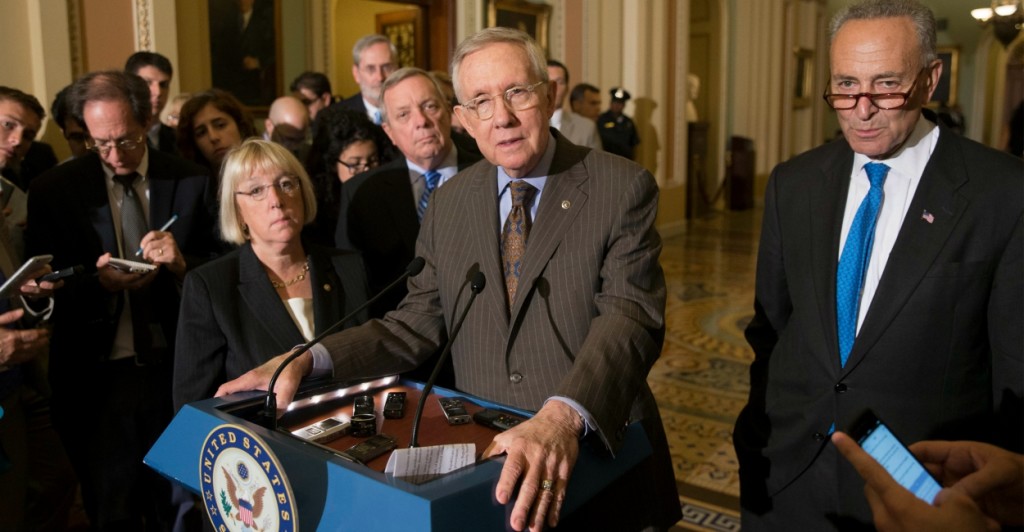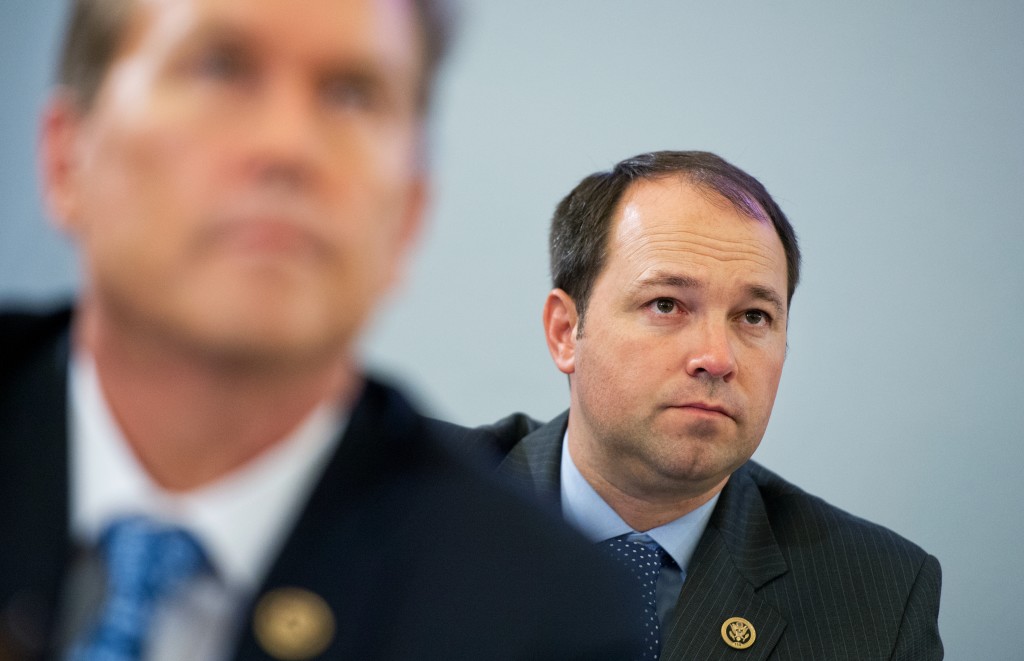Republicans riding high after passing their first budget plan in six years earlier this year are in for a familiar scare: the specter of a fiscal cliff and a so-called mega spending deal that may come with it.
But even as the stars align for such an all-in-one deal — the government again will likely run out of money at around the same time its borrowing authority expires in early December — conservatives say they will not give in on spending increases.
“I would oppose any effort to violate the budget that has already been adopted by Congress,” said Rep. Tom McClintock, R-Calif., of the House Budget Committee.
“It is our budget or bankruptcy.”
While Congress faces a short-term deadline of Oct. 1 to prevent a shutdown, lawmakers are also trying to reach a deal on a longer spending measure that would likely run through the end of the fiscal year in September 2016.
A congressional budget plan — and another presented by President Obama — is supposed to guide that process.
Though the Republican-controlled Congress ratified a 10-year budget in May that cuts spending by $5.3 trillion — keeping discretionary domestic spending below the limits imposed by the Budget Control Act of 2011 — its implementation went nowhere.
That’s because a budget deal by Congress serves merely as a nonbinding blueprint that does not require Obama’s signature.
Republican committee chairmen have to draft legislation — in the form of 12 separate bills appropriating money for different government departments — that actually impose the prescribed cuts dictated by the budget.
Democrats — vowing to block legislation that does not raise domestic spending to match an increase in defense spending — have stymied that process in the Senate, filibustering bills that keep intact sequestration.
Indeed, the Senate has passed exactly zero appropriations bills, while the House has approved six of them.
“Harry Reid will block all appropriations bills until some grand bargain is agreed to,” said Paul Winfree, an economic expert at The Heritage Foundation who used to work on the Senate Budget Committee. “And President Obama has issued a veto threat to each appropriations bill because they don’t go above the spending caps. In an ideal world, they would consider everything separate, but Democrats and the president have made that impossible.”

Senate Democrats have blocked Republicans from appropriating bills to fund a budget. (Photo: Michael Reynolds/EPA/Newscom)
The result is that after Congress overcomes its latest flirtation with a shutdown — likely passing before Sept. 30 a short-term bill to fund the government through early December — lawmakers will at that time feel pressure do something bigger.
And for the GOP, big is bad.
Republicans believe that dealing with issues individually allows for more scrutiny and that package deals lead inevitably to tax and fee increases.
“We are likely heading for chaos, probably to be aimed at the end of December when everyone wants to go home for Christmas,” said Rep. Dave Brat, R-Va., also of the House Budget Committee.
“The American people will be very upset if they see something like last year, where the right throws the kitchen sink and the left throws the kitchen sink and we hand more debt to our children.”
Knowing that Republican leaders are desperate to head off a financial crisis going into an election year, conservatives are already anticipating concessions.
Rep. Marlin Stutzman, R-Ind., is circulating a letter in Congress, addressed to House Speaker John Boehner of Ohio and Senate Majority Leader Mitch McConnell of Kentucky, encouraging them to not spend beyond the 2011 caps.
Republicans’ budget blueprint does technically get around the cap for military spending by funneling billions of dollars to a “war fund” that is exempt from sequestration.
In the letter — which is still open for signatories and has not yet been sent — Stutzman of the House Budget Committee writes: “For us to believe that the Republican budget was adopted in good faith, we must not increase the BCA [Budget Control Act] caps.”

Rep. Marlin Stutzman, R-Ind., (right), pictured with Rep. Vern Buchanan, R-Fla., is leading an effort to prevent Republican leaders from spending over prescribed budget caps. (Photo: Tom Williams/CQ Roll Call/Newscom)
The letter concludes that “if we do bust through the caps, we would have to acknowledge a new reality in which House Republicans cannot be trusted to keep the promises we make to our constituents, which would therefore give us pause before supporting future budget resolutions.”
Stutzman has already picked up more than 25 co-signers to the letter, including Brat and McClintock, and conservative stalwarts such as Reps. Jim Jordan of Ohio, Mick Mulvaney of South Carolina and Raul Labrador of Idaho.
These lawmakers would like for congressional leaders to use the time between the likely passage of a short-term government funding bill and its expiration to take another stab at passing individual spending bills through the normal appropriations process.
“Ultimately Harry Reid and the Democratic blockade will have to answer to the American people,” McClintock told The Daily Signal.
“I expect the House to fill its responsibility to send the rest of the appropriations bills over to the Senate, and for McConnell to bring them up every single day until we count down to a shut down. The only justification for a short-term CR [continuing resolution] is so the House and Senate can continue that work.”
But the effort faces an uphill battle.
With the government’s borrowing power set to give out as early as November and another shutdown looming in early December — plus the need to pay for roads and bridges and to extend billions in expired tax breaks — the itch to tackle it all may prove too tempting.
“The last time I checked, Republicans in the House and Senate believe in smaller government, not bigger,” Brat told The Daily Signal. “Instead, it is a mystery to me how this will unfold. I anticipate more drama. And I don’t want a bad outcome blamed on me, or any conservatives when we are not engaged in the regular process.”
Brat concluded:
“We knew this was coming, but in waiting for a crisis in December, we are following, not leading. We are not winning. President Obama is winning time and time again, and Congress finds itself backed up at crunch time.”






























